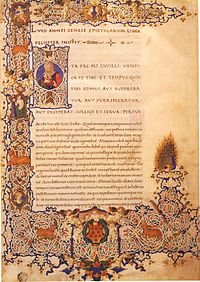
Back رسائل أخلاقية إلى لوسيلوس Arabic Epistulae morales ad Lucilium Catalan Výbor z listů Luciliovi Czech Epistulae morales German Cartas a Lucilio Spanish Epistulae Morales ad Lucilium Basque رسالههای اخلاقی به لوسیلیوس Persian Kirjeet Luciliukselle Finnish Lettres à Lucilius French Bréf um siðfræði til Luciliusar Icelandic
 15th-century illuminated manuscript, Laurentian Library | |
| Author | Seneca |
|---|---|
| Language | Latin |
| Subject | Ethics |
| Genre | Philosophy |
Publication date | c. 65 AD |
| Publication place | Ancient Rome |
| Text | Epistulae Morales ad Lucilium at Wikisource |
Epistulae Morales ad Lucilium (Latin for "Moral Letters to Lucilius"), also known as the Moral Epistles and Letters from a Stoic, is a letter collection of 124 letters that Seneca the Younger wrote at the end of his life, during his retirement, after he had worked for the Emperor Nero for more than ten years. They are addressed to Lucilius Junior, the then procurator of Sicily, who is known only through Seneca's writings.
The letters often begin with an observation on daily life, and then proceed to an issue or principle abstracted from that observation. The result is like a diary, or handbook of philosophical meditations. The letters focus on many traditional themes of Stoic philosophy such as the contempt of death, the stout-heartedness of the sage, and virtue as the supreme good.